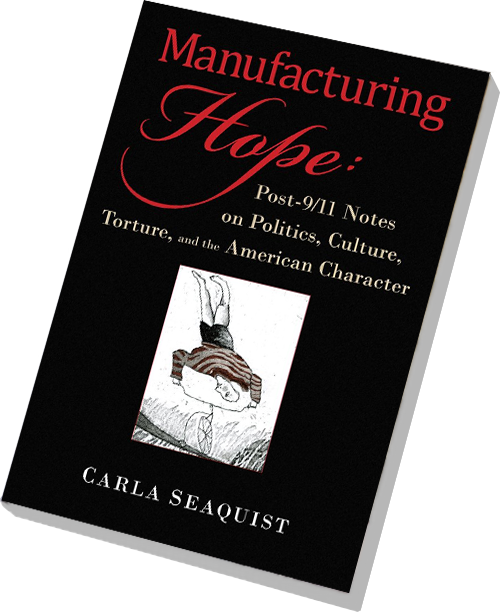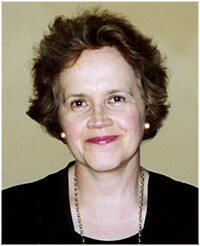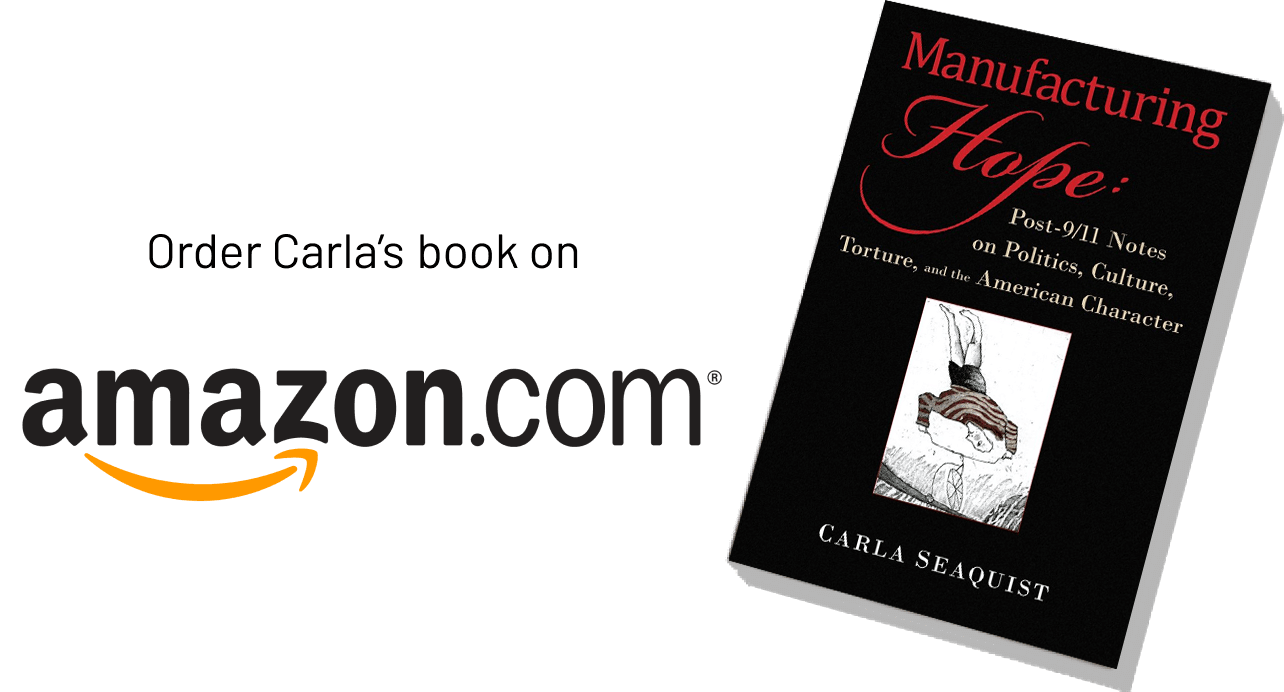MANUFACTURING HOPE: POST-9/11 NOTES ON POLITICS, CULTURE, TORTURE, AND THE AMERICAN CHARACTER
by Carla Seaquist

A collection of the author’s commentary for
The Christian Science Monitor:
“Big-think in a personal voice”
Includes published work (“Reinventing ‘normalcy,’” “Behemoth in a bathrobe,” “Goodbye, Tony Soprano. Welcome back, Atticus Finch”); new work (“Of hypocrites, ‘moralizers,’ and Frank Rich,” “Back to Casablanca,” “Going after Godot“); and a section on torture (including “Abu Ghraib and the mirror,” “Bush’s torture policy hurts our soldiers,” “Resetting our moral compass with a torture commission”). Described by The Christian Science Monitor as “big-think in a personal voice.”
Table of Contents
- Introductionviii
- Reinventing “normalcy” (op-ed)1
- The American “street” and foreign policy (op-ed)4
- Behemoth in a bathrobe (dialogue)7
- America, we need to talk—seriously(op-ed)12
- Accidental convention delegate gripped by hands-on democracy (op-ed)15
- At heart of good political discussion: the idea (op-ed)18
- In praise of a murdered “do-gooder” (op-ed)21
- Stop the burlesque!: American pop culture in a tinderbox world (essay)24
ours and the world’s.
- Notes for a moderate’s manifesto (op-ed)36
- Harold Pinter’s pen betrays his normalcy40
- Letter to The New York Times47
- Abu Ghraib and the mirror (op-ed)48
- Marching orders from a survivor of Auschwitz (op-ed).51
- Democrats: Make torture a campaign issue and values a theme (essay)54
- Bush’s torture policy hurts our soldiers (op-ed)65
- In ’08: Reject torture—and redeem America’s soul (op-ed)68
- Free speech, responsible speech, and the “right to offend” (op-ed)73
- Of hypocrites, “moralizers,” and Frank Rich (essay)77
- Wrong way to judge a candidate (op-ed)89
- Back to “Casablanca” (dialogue)92
for the dream of America as moral beacon.
- Humanities for a post-9/11 America (essay)103
- In defense of the conscientious public (op-ed)105
- From disaster springs humanity (op-ed)110
- A call for responsible change (op-ed)113
- Put Iraq back on the front burner (op-ed)117
- The anger of (feminist) experience (essay)120
- Obama and American anti-elitism (op-ed)125
be an elitist?
- Goodbye, Tony Soprano. Welcome back, Atticus Finch. (essay)128
- Hope and virtue (essay)136
George Washington.
- Resetting our moral compass with a torture commission (op-ed)141
issue, is best confronted in a commission setting.
- Going after Godot about hope and torture (essay)145
- Goodbye, Tony Soprano. Welcome back, Atticus Finch: as op-ed149
INTRODUCTION
Sometimes History intervenes and drives one’s themes.
When the terrorist attacks of September 11, 2001 hit New York City, Washington, D.C., and Shanksville, Pennsylvania, my husband and I were living in one of those targets—Washington, D.C. From our kitchen window high over Connecticut Avenue we could see, three miles away, the massive Pentagon on fire, filling the morning sky with a roiling, black cloud—a throat-catching sight I can still see. Over and over in my mind ran the headline, “The Capital City has been attacked, the Capital City has been attacked!”
Transfixed by the sight, I tried to fashion a response. History is happening, what do I think? In that moment, and as I dug deep the following weeks, I knew I didn’t want to respond as the playwright I then was, to portray how “throat-catching” was that day and its aftermath; an emotional response wouldn’t suffice. History had dealt America a blow, possibly a mortal one, and I wanted to make sense of it, help us recover. Best tool, it seemed to me, was the great legacy of the Enlightenment: Reason. In chaos, keep your head and think. I could return to playwriting once there emerged what Henry James called “the figure in the carpet”; but first, that figure had to be designed and assembled.
I began writing opinion pieces about the nexus where politics, culture, and the American character intersect—to me, a fascinating spot. To ferret out the deeper meaning I address topics after they have been chewed over by the commentariat. It was after several years, when the misrule of President George W. Bush had cast its own dark cloud over America—a cloud created by unnecessary war in Iraq, departure from rule of law, and, especially dark, our shameful descent into torture—that I realized I was…manufacturing hope. During the Bush years hope had faded and despair took told. I felt useful at the barricades manufacturing, with op-eds, the elixir without which America is not America: hope. This book contains those op-eds, as well as essays and dialogues.
The term “manufacture hope” comes from my experience in the mid-’90s when I had the honor to serve as lifeline, via phone calls, to a man under siege in Sarajevo. When the sniping escalated to shelling and it seemed Vlado might die, when all seemed, as he said, “hopeless,” we began to speak of manufacturing hope. It worked: He survived. I hope it works for us, too. Vlado worried, post-Sarajevo, about what lay in store for America.
I wish to thank especially The Christian Science Monitor, the venerable venue where most of these op-eds were published. The Monitor, a nondenominational paper with international circulation, remains singular in its welcome to moral thought. I prize its characterization of my work as “big-think in a personal voice.” Big thanks to my editors over the years there: Linda Feldmann, Clara Germani, Kendra Nordin, Josh Burek. And, as ever, thanks to my husband Larry—indefatigable manufacturer of hope.
Carla Seaquist
Gig Harbor, June 2009
AUTHOR BIO
Carla Seaquist is an author, commentator, and playwright. Since 9/11 she has focused on commentary, writing on politics, culture, and ethical-moral issues, first for The Christian Science Monitor and since 2009 for The Huffington Post. An earlier book of commentary is titled Manufacturing Hope: Post-9/11 Notes on Politics, Culture, Torture, and the American Character. She also published Two Plays of Life and Death, which includes Who Cares?: The Washington-Sarajevo Talks and Kate and Kafka.
Ms. Seaquist’s earlier career in civil rights culminated with the post of Equal Opportunity Officer for the City of San Diego and appointment to the Governor’s Task Force on Civil Rights. She majored in international relations in college (School of International Service, American University) and graduate school (School of Advanced International Studies, Johns Hopkins University). Long a resident of Washington, D.C., she now lives in the “other” Washington (Gig Harbor), where she served on the board of Humanities Washington. Her husband Larry, a former Navy captain, served in the legislature as a state representative (Democrat) from 2006 to 2014, chairing for two terms the House committee on higher education.

